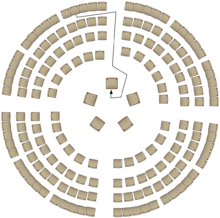Fishbowl (conversation)
A fishbowl conversation is a form of dialog that can be used when discussing topics within large groups. Fishbowl conversations are usually used in participatory events like Open Space Technology and Unconferences. The advantage of Fishbowl is that it allows the entire group to participate in a conversation. Several people can join the discussion.
Method(s)

Four to five chairs are arranged in an inner circle. This is the fishbowl. The remaining chairs are arranged in concentric circles outside the fishbowl. A few participants are selected to fill the fishbowl, while the rest of the group sit on the chairs outside the fishbowl. In an open fishbowl, one chair is left empty. In a closed fishbowl, all chairs are filled. The moderator introduces the topic and the participants start discussing the topic. The audience outside the fishbowl listen in on the discussion.
In an open fishbowl, any member of the audience can, at any time, occupy the empty chair and join the fishbowl. When this happens, an existing member of the fishbowl must voluntarily leave the fishbowl and free a chair. The discussion continues with participants frequently entering and leaving the fishbowl. Depending on how large your audience is you can have many audience members spend some time in the fishbowl and take part in the discussion. When time runs out, the fishbowl is closed and the moderator summarizes the discussion.
An immediate variation of this is to have only two chairs in the central group. When someone in the audience wants to join the two-way conversation, they come forward and tap the shoulder of the person they want to replace, at some point when they are not talking. The tapped speaker must then return to the outer circles, being replaced by the new speaker, who carries on the conversation in their place.
In a closed fishbowl, the initial participants speak for some time. When time runs out, they leave the fishbowl and a new group from the audience enters the fishbowl. This continues until many audience members have spent some time in the fishbowl. Once the final group has concluded, the moderator closes the fishbowl and summarizes the discussion.
Advantages
An advantage of a fishbowl conversation is that it is suitable for large groups. Another advantage is that they lessen distinctions between the speakers and the audience. These two reasons have made fishbowls popular in participatory group meetings and conferences such as Open Space Technology and Unconferences.
Variations
The group can be split into two smaller and distinct subgroups (such as men and women, or older and younger participants), who convene separately and come up with three to four questions for the other group, which are written on cards. The participants reconvene and exchange cards, and form two circles, one subgroup inside the other, both of them facing inwards. The inside group read a question and discuss it, while those in the outside circle listen but do not speak. Each question is discussed in this way, making sure everyone in the inner circle has a chance to speak. The circles are then reversed. The questions that the groups generate can be on the same subject or not, at the discretion of the organizer. This version is a good party game for groups of thirty to sixty people.[1]
Another derivative is to have the fish bowl run for a certain period of time - say, half an hour. The moderator stops the discussion in the fishbowl circle and invites those not in the inner circle to offer their thoughts and comments on what they are hearing in the inner circle.
References
- ↑ Taddeo, Jan E. (June 9, 2006). "A Unitarian Universalist Approach to Youth Ministry". uua.org. Retrieved 25 February 2010.
Further reading
- "Fishbowl: The art of active listening". Office of the Commissioner, United Nations Human Rights. Retrieved 2012-12-02.
- Hamlin, Kaliya (July 12, 2006). "Unconference Methods: Fish Bowl Dialogue". Blog post from a commercial enterprise.
- Atlee, Tom. "Closed Fishbowl". The Co-intelligence Institute. Posting on the website of a non-profit organization.
- "Using Fishbowl for class discussions". Blog post, apparently unsigned.